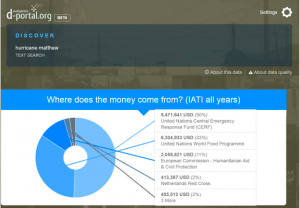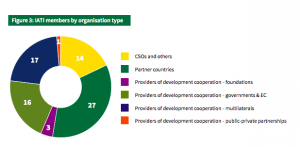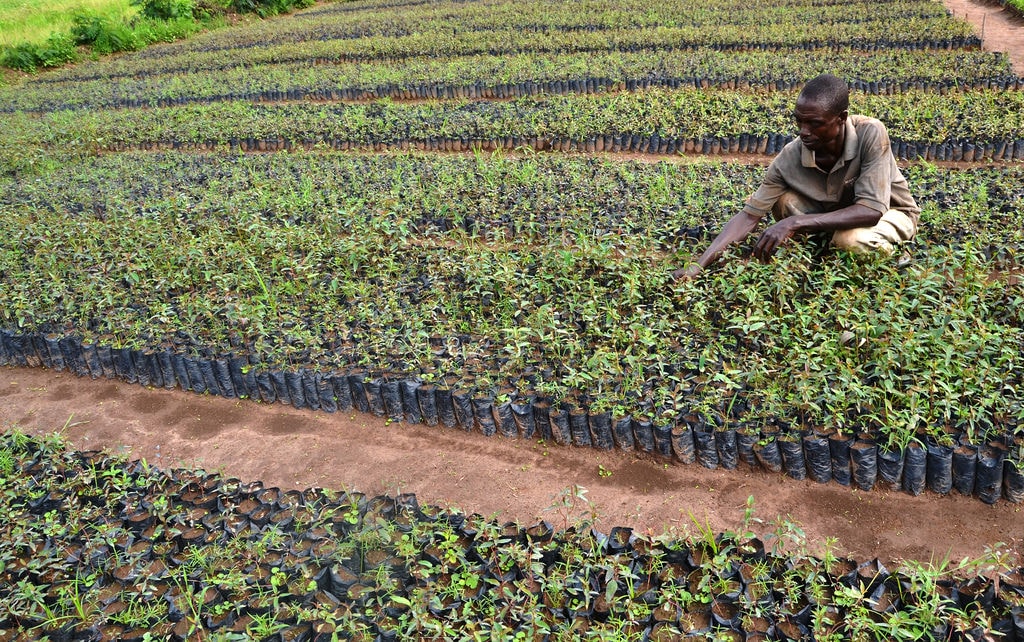What is IATI?
The International Aid Transparency Initiative (IATI) was launched in 2008. It is a voluntary, multi-stakeholder initiative that seeks to increase the transparency of development cooperation in order to increase its effectiveness in tackling poverty.
It has designed a standard for publishing data on development cooperation in a common, open format, built on consultation and engagement with developing countries, development cooperation providers, Civil Society Organizations (CSOs) and independent experts.
IATI focuses on user-centric publication of data, recognizing that timely, comprehensive, forward-looking and accessible information is essential to enable governments, civil society, parliamentarians and other stakeholders to plan and monitor development activities and hold development actors to account.
IATI and Development Initiatives have recently developed a new tool – d-portal – a country-based information platform that tracks resource flows and aims to provide line ministries, parliamentarians and civil society with information that can assist with the planning and monitoring of development activities. d-portal not only shows what information is available to stakeholders at country level, it also highlights the gaps. It uses IATI and OECD DAC CRS (Organization for Economic Cooperation and Development – Development Aid Cooperation – Creditor Reporting System) data to populate the platform, which enables users to view maps, graphs, tables and links to raw data.

IN THE PHOTO: d-portal. PHOTO CREDIT: IATI Report 2016
To date, over 500 organizations have published data in the IATI Standard. These include traditional donors as well as national and international NGOs, private philanthropic foundations, development finance institutions and private sector consultancies.
What are the benefits of IATI?
By accessing data published through IATI, governments can plan and manage their budgets, combining both domestic and development cooperation resources, based on accurate and timely financial data. Through easier access to data parliamentarians, CSOs and citizens can hold governments to account on what development cooperation has been received and how it should be used; community-based organizations can influence how resources are used; and journalists, researchers and activists can find out more on how development cooperation resources are applied and what impact they are having. At country level, all stakeholders can build a complete picture of the resources available for development, whatever their sources are.
IN THE PHOTO: IATI members by organisation type. PHOTO CREDIT: IATI Report 2016
For IATI publishers, IATI data is increasingly used to drive open aid portals such as DFID’s Development Tracker, openaid.se and openaid.nl. These interactive tools help users track donor spending and can play an important role in promoting greater accountability to parliament, CSOs and citizens.
FAO and IATI
As part of FAO’s commitment to transparency and openness in the implementation of its programmes, FAO joined IATI in 2016.
Since May 2017 FAO publishes IATI data on a quarterly basis for all Trust Fund and TCP. The 1500 active projects currently published on d-portal cover the whole spectrum of FAO interventions in the emergency, resilience and development contexts: to cite only a few, these span from harnessing the power of rural youth in Guatemala, to supporting women entrepreneurs in providing nutrition and food safety in Ghana, as well as strengthening dairy sector in Ukraine, supporting Syrian farmers to continue their cereal production or ensuring sustainable agricultural systems in Samoa.
 In the photo: Licking blocks for feeding small breeding in support to integrated farming in Mwaro, a central province of Burundi – promoted by FAO project MAW SO2 PHOTO CREDIT: ©FAO/Gustave Ntaraka
In the photo: Licking blocks for feeding small breeding in support to integrated farming in Mwaro, a central province of Burundi – promoted by FAO project MAW SO2 PHOTO CREDIT: ©FAO/Gustave Ntaraka
This publication provides anybody with internet access the ability and right to obtain, use, reuse and republish information on FAO Trust Fund and Technical Cooperation Projects. Information provided includes the project name, description, budget, contributions and total quarterly expenditure, resource partner (donor) and country of implementation. The projects are also coded against OECD DAC purpose code (which inform on socio-economic sector and purpose of the activity) and several policy markers (such as climate change, gender etc.).
Following the initial publication of data, which included active projects at the cut-off date of 31 December 2016, FAO has regularly published data for 1st, 2nd and 3rd quarters of 2017.
FAO will continue its quarterly publications and plans to create its own portal and make it available through its website. Through this portal, development partners and the public at large will be able to explore various aspects of FAO work through an interactive data visualization experience.
In the photo: Tree nurseries by FAO project MAW SO2 for the protection of micro-watersheds in Mwaro province of Burundi. Photo Credit: ©FAO/Gustave Ntaraka
The principal idea behind IATI is to provide up-to-date, comprehensive and forward-looking data to improve planning within countries, coordination between development actors and accountability for results, ultimately increasing aid effectiveness and improving public trust. In this spirit, FAO will continue to work on expanding the quantity and improving the quality of the data published over the following months. At the same time, FAO is also actively working on improving aspects of the standard, in collaboration with other UN agencies, the IATI secretariat and OECD, in order to ensure the data published, in particular for the agriculture sector, is more informative and useful to all stakeholders
FAO is very proud to have joined IATI. Through data release, the organisation intends to promote improved coordination and efficiencies in its work towards the 2030 Agenda. FAO believes that its data release will contribute to enhancing trust with its stakeholders, including its member nations, resource partners and projects/programmes beneficiaries. FAO also believes that, through data release and increased access to information, the Organization and all those contributing to IATI are encouraging more informed decision-making and empowering stakeholders to influence actions.
EDITORS NOTE: The opinions expressed here by Impakter.com columnists are their own, not those of Impakter.com










